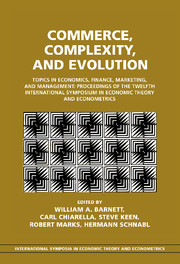 Commerce, Complexity, and Evolution
Commerce, Complexity, and Evolution Book contents
- Frontmatter
- Contents
- Series editor's preface
- Volume editors' preface
- Editors
- List of contributors
- I Philosophical and methodological implications of complexity and evolution in economic systems
- 1 Toward a generalized Coase theorem: a theory of the emergence of social and institutional structures under imperfect information
- 2 Universal Darwinism and social research: the case of economics
- 3 Uncertainty, risk, and chaos
- 4 The role of innovation in economics
- II Finance and the macroeconomy
- III Market and sectoral dynamics
- IV Marketing and interdependent behavior
1 - Toward a generalized Coase theorem: a theory of the emergence of social and institutional structures under imperfect information
Published online by Cambridge University Press: 05 December 2011
- Frontmatter
- Contents
- Series editor's preface
- Volume editors' preface
- Editors
- List of contributors
- I Philosophical and methodological implications of complexity and evolution in economic systems
- 1 Toward a generalized Coase theorem: a theory of the emergence of social and institutional structures under imperfect information
- 2 Universal Darwinism and social research: the case of economics
- 3 Uncertainty, risk, and chaos
- 4 The role of innovation in economics
- II Finance and the macroeconomy
- III Market and sectoral dynamics
- IV Marketing and interdependent behavior
Summary
Present-day mainstream neoclassical economic theory is built on the perfect competition paradigm. It can be shown that, when the paradigm and its underlying assumptions are satisfied, an economy ends up in general equilibrium that represents the highest possible state of welfare. To reach this state, three assumptions must be satisfied. First, perfectly competitive markets must exist, including perfect information for all agents operating on these markets. Second, there must be two exogenous sets of fixed parameters, consumer preferences and production technology. Third, all agents must adopt utility maximization as their behavioral motive. Equilibrium is reached when all pairs of marginal costs and benefit ratios are equalized. At that point entropy is maximized and economic activity – agents making choices – must necessarily cease because no agent can further improve his or her position. At best, economic activity goes on in the reproductive mode, whereby agents eternally exchange the same mix of goods and services at the same prices. In the absence of external impulses, the economic system dies an entropy death.
From a systems theory point of view, the neoclassical perfect competition paradigm is incomplete because it has no entropy-decreasing mechanism and is not self-sustainable. In the case of economic systems, a competition-reducing force is required to keep it going. That is precisely the role of innovation. In terms of the neoclassical model, innovation can be introduced only through modification of exogenous behavioral parameters, consumer preferences, and production technology. In ordinary language, this is called inventions and the introduction of new consumer ideas.
To make innovation a regular feature of the economic model, these exogenous parameter modifications need to be endogenized in the system.
- Type
- Chapter
- Information
- Commerce, Complexity, and EvolutionTopics in Economics, Finance, Marketing, and Management: Proceedings of the Twelfth International Symposium in Economic Theory and Econometrics, pp. 3 - 20Publisher: Cambridge University PressPrint publication year: 2000
- 2
- Cited by


